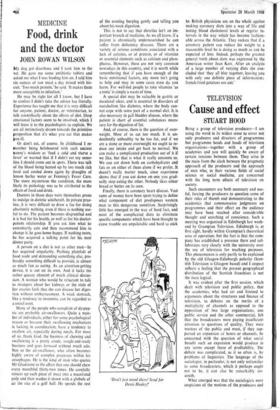Cause and effect
TELEVISION STUART HOOD
Bring a group of television producers—I am using the word in its widest sense to cover not only producers and directors of programmes but programme heads and heads of television organisations—together with a group of academics and you will quickly be aware of certain tensions between them. They arise in the main from the clash between the pragmatic approach of the producers and the approach of men who, in their various fields of social science or social medicine, are concerned with the long term effects of television on society.
Such encounters are both necessary and use- ful, forcing the producers to question some of their rules of thumb and demonstrating to the academics that commonsense judgments on programmes and their effect on the audience may have been reached after considerable thought and searching of conscience. Such a meeting was organised in Edinburgh last week- end by Grampian Television. Edinburgh is, at first sight, hardly within Grampian's theoretical area of operation; but the fact is that the com- pany has established a presence there and col- laborates very closely with the university over the use of television for teaching purposes. This phenomenon is only partly to be explained by the old Glasgow-Edinburgh polarity (Scot- tish Television is Glasgow based) and I suspect reflects a feeling that the present geographical distribution of the Scottish franchises is not the most logical.
It was evident after the first session, which dealt with television and public policy, that the academics, who had sat and listened to arguments about the structures and finance of television, to debates on the merits of a multiplicity of channels as opposed to the opposition of two large organisations, one public service and the other commercial, felt that the broadcasters were paying insufficient attention to questions of quality. They were trustees of the public and must, if they sup- ported an expansion of hours or channels, be concerned with the question of what social benefit such an expansion would produce in any terms except those of profitability. The .debate was complicated, as it so often is, by problems of linguistics. The language of the sociologist, in particular, is not only unfamiliar to some broadcasters, which it perhaps ought not to be, it can also be remarkably un- couth.
What emerged was that the sociologists were suspicious of the motives of the producers and
felt that they were, on occasions, heedless of the consequences of their decisions. The pro- ducers, on the other hand, were not over- impressed by the evidence put forward by the sociologists on such subjects as the effect of violence on television audiences, and felt that the experts had not succeeded in demonstrating in any very exact way, such as might help programme makers, a causal nexus between violent episodes in programmes and violence in real life.
They drew comfort from the fact that an eminent social psychiatrist, while maintain- ing that children must be protected as un- able to deal with painful experiences on the television screen, supported the showing (in a late bulletin) of an execution in Nigeria. The realities of life as it is today, he felt, should not be suppressed.
This kind of dialogue is bound to continue and the contact between the universities and the producers is bound to become closer as television is developed as a teaching medium. In this field what is exciting is not the prospect of the Open University; that may very quickly be rendered obsolete by technological advance in the shape of Eva—a method of recording television programmes which allows them to be played back through any television set by simply plugging a player into the aerial socket. Costs will initially be high but there is every sign that within the next decade it may be as cheap (or as dear) to buy television programmes for screening at one's own time as it is at present to buy gramophone records. The potential of the new device as a means for study at home or in the university is im- mense.



































 Previous page
Previous page